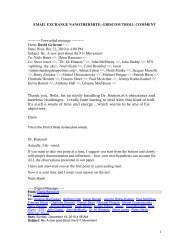court of appeal for ontario - academicfreedom.ca
court of appeal for ontario - academicfreedom.ca
court of appeal for ontario - academicfreedom.ca
You also want an ePaper? Increase the reach of your titles
YUMPU automatically turns print PDFs into web optimized ePapers that Google loves.
- 25 -<br />
treated as an unlimited source <strong>of</strong> funds with the result that marginal appli<strong>ca</strong>tions would<br />
be encouraged” (p. 306). In Re Lavigne and Ontario Public Service Employees Union<br />
(No. 2) (1987), 60 O.R. (2d) 486 (H.C.J.), White J. held that “it is desirable that<br />
Charter litigation not be beyond the reach <strong>of</strong> the citizen <strong>of</strong> ordinary means” (p. 526).<br />
He awarded costs to the successful Charter appli<strong>ca</strong>nt in spite <strong>of</strong> the fact that his<br />
representation had been paid <strong>for</strong> by a third-party organization (so that he would not,<br />
on the traditional approach, have been entitled to any indemnity). This <strong>ca</strong>se was<br />
overturned on the merits on <strong>appeal</strong> (Lavigne v. O.P.S.E.U. (1989), 67 O.R. (2d) 536<br />
(C.A.), aff’d [1991] 2 S.C.R. 211), but neither the Ontario Court <strong>of</strong> Appeal nor this<br />
Court expressed any disapproval <strong>of</strong> White J.’s remarks on costs. Referring to both<br />
Canadian Newspapers and Lavigne in Rogers v. Sudbury (Administrator <strong>of</strong> Ontario<br />
Works) (2001), 57 O.R. (3d) 467 (S.C.J.), Epstein J. concluded at para. 19 that “costs<br />
<strong>ca</strong>n be used as an instrument <strong>of</strong> policy and . . . making Charter litigation accessible to<br />
ordinary citizens is recognized as a legitimate and important policy objective”.<br />
29 In B. (R.) v. Children’s Aid Society <strong>of</strong> Metropolitan Toronto, [1995] 1<br />
S.C.R. 315, the appli<strong>ca</strong>nts, who were Jehovah’s Witnesses, unsuccessfully argued that<br />
their Charter rights had been violated when a blood transfusion was administered to<br />
their baby daughter over their objections. Instead <strong>of</strong> granting costs in the <strong>ca</strong>use, the<br />
District Court judge directed the intervening Attorney General to pay the appli<strong>ca</strong>nts’<br />
costs. Whealy Dist. Ct. J. cited Osler J.’s statement in Canadian Newspapers, supra,<br />
that bona fide challenges should not be deterred, and observed that the <strong>ca</strong>se be<strong>for</strong>e him<br />
was an unusual one involving a matter <strong>of</strong> province-wide importance (see [1989] O.J.<br />
No. 205 (QL) (Dist. Ct.)). His costs order, although unconventional, was upheld on<br />
<strong>appeal</strong> by the Ontario Court <strong>of</strong> Appeal, and subsequently by this Court. At the Court<br />
<strong>of</strong> Appeal, Tarnopolsky J.A. noted that this <strong>ca</strong>se, in which “the parents rose up against<br />
2003 SCC 71 (CanLII)



